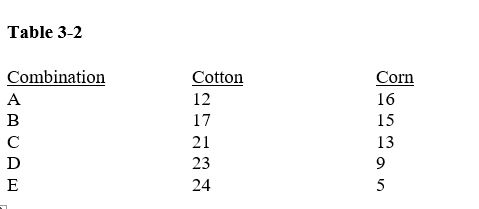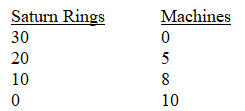Exam 3: The Fundamental Economic Problem: Scarcity and Choice
Exam 1: What Is Economics232 Questions
Exam 2: The Economy: Myth and Reality155 Questions
Exam 3: The Fundamental Economic Problem: Scarcity and Choice255 Questions
Exam 4: Supply and Demand: an Initial Look313 Questions
Exam 5: Consumer Choice: Individual and Market Demand206 Questions
Exam 6: Demand and Elasticity214 Questions
Exam 7: Production, Inputs, and Cost: Building Blocks for Supply Analysis221 Questions
Exam 8: Output, Price, and Profit: the Importance of Marginal Analysis194 Questions
Exam 9: Securities: Business Finance and the Economy: the Tail That Wags the Dog203 Questions
Exam 10: The Firm and the Industry Under Perfect Competition212 Questions
Exam 11: Monopoly208 Questions
Exam 12: Between Competition and Monopoly230 Questions
Exam 13: Limiting Market Power: Regulation and Antitrust155 Questions
Exam 14: The Case for Free Markets: the Price System225 Questions
Exam 15: The Shortcomings of Free Markets219 Questions
Exam 16: Externalities, the Environment, and Natural Resources222 Questions
Exam 17: Taxation and Resource Allocation221 Questions
Exam 18: Pricing the Factors of Production233 Questions
Exam 19: Labor and Entrepreneurship: the Human Inputs271 Questions
Exam 20: Poverty, Inequality, and Discrimination172 Questions
Exam 21: Is Useconomic Leadership Threatened75 Questions
Exam 22: An Introduction to Macroeconomics216 Questions
Exam 23: The Goals of Macroeconomic Policy212 Questions
Exam 24: Economic Growth: Theory and Policy228 Questions
Exam 25: Aggregate Demand and the Powerful Consumer219 Questions
Exam 26: Demand-Side Equilibrium: Unemployment or Inflation216 Questions
Exam 27: Bringing in the Supply Side: Unemployment and Inflation228 Questions
Exam 28: Managing Aggregate Demand: Fiscal Policy210 Questions
Exam 29: Money and the Banking System224 Questions
Exam 30: Monetary Policy: Conventional and Unconventional210 Questions
Exam 31: He Financial Crisis and the Great Recession66 Questions
Exam 32: The Debate Over Monetary and Fiscal Policy219 Questions
Exam 33: Budget Deficits in the Short and Long Run215 Questions
Exam 34: The Trade-Off Between Inflation and Unemployment219 Questions
Exam 35: International Trade and Comparative Advantage223 Questions
Exam 36: The International Monetary System: Order or Disorder218 Questions
Exam 37: Exchange Rates and the Macroeconomy219 Questions
Select questions type
When a firm or economy is operating efficiently, it is operating
(Multiple Choice)
4.9/5  (36)
(36)
The total amount of consumption of a society can be increased if
(Multiple Choice)
4.8/5  (42)
(42)
The fact that resources tend to be specialized is one reason the production possibilities frontier is drawn
(Multiple Choice)
4.8/5  (38)
(38)
Explain the relationship between opportunity costs and money costs.Can they be treated as identical?
(Essay)
4.8/5  (29)
(29)
 -In Table 3-2, from point C, the opportunity cost of 3 more units of cotton would be
-In Table 3-2, from point C, the opportunity cost of 3 more units of cotton would be
(Multiple Choice)
4.8/5  (41)
(41)
See table below.Does production exhibit increasing costs?
Which ring and machine combination will achieve the highest growth in the production of mood rings?

(Essay)
4.8/5  (34)
(34)
Generally, the opportunity cost and the money cost of a good
(Multiple Choice)
4.9/5  (43)
(43)
As more of a good is produced, its opportunity cost tends to increase because resources are not equally efficient at producing all goods.
(True/False)
4.8/5  (31)
(31)
A society's decision to produce more tanks may require it to forgo production of some cars.
(True/False)
4.8/5  (36)
(36)
A society which is inside its production possibilities frontier is efficient.
(True/False)
4.7/5  (40)
(40)
Market economies are not constrained by scarcity; only planned economies have that problem.
(True/False)
4.8/5  (34)
(34)
Why would it be a mistake to treat opportunity costs and explicit monetary costs as identical?
(Multiple Choice)
4.8/5  (50)
(50)
Why might the money price for something be higher than the opportunity cost? Why might it be lower? Give an example of each to illustrate your answer.
(Essay)
4.8/5  (39)
(39)
Showing 141 - 160 of 255
Filters
- Essay(0)
- Multiple Choice(0)
- Short Answer(0)
- True False(0)
- Matching(0)